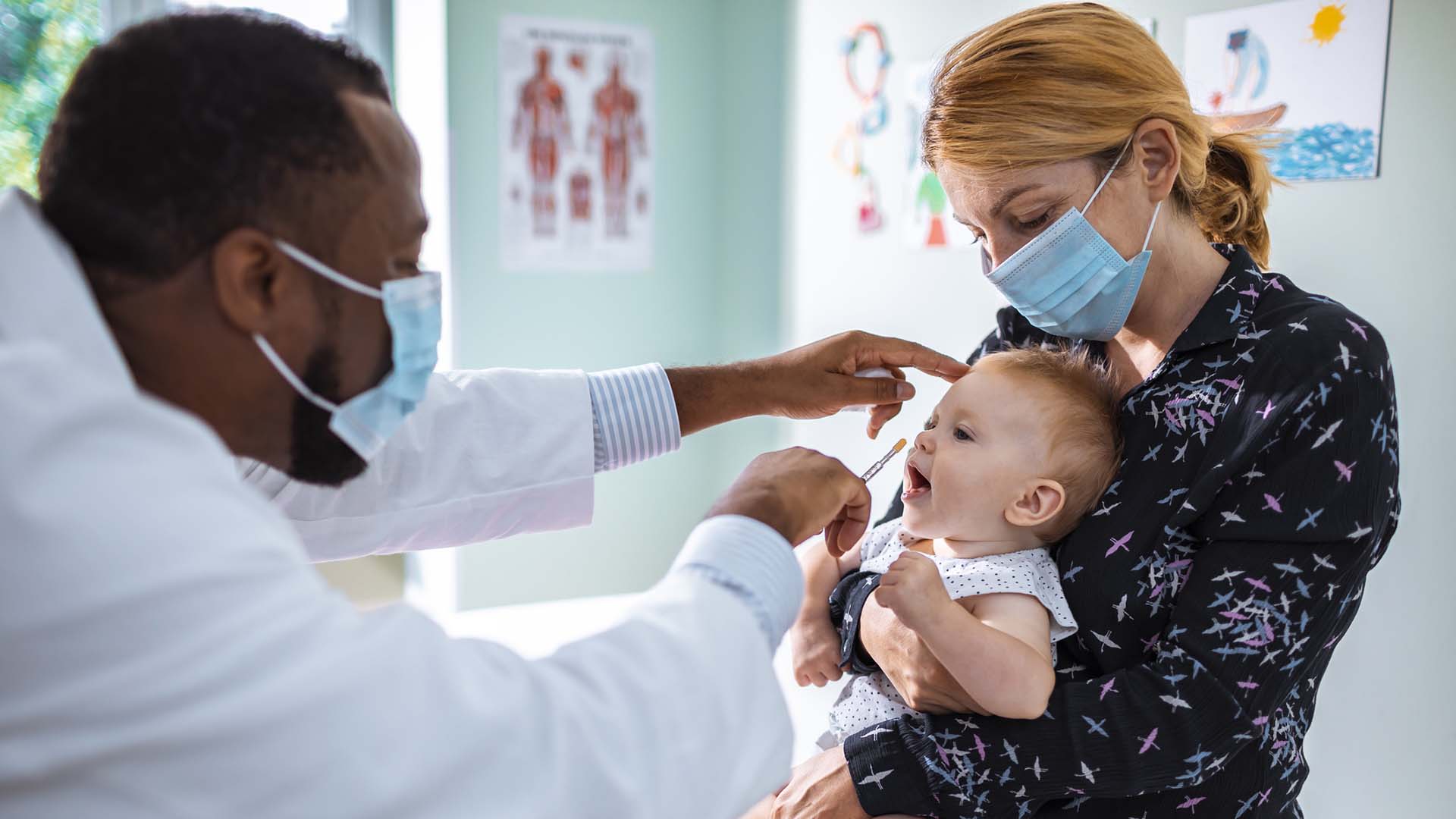Updated on April 24, 2025
Children get sick often—and to some extent, this is not a bad thing. Like all the other parts of the body, the immune system is in an important stage of growth and development during the first years of life. Encountering viruses helps a child’s immune system learn to defend against them.
At the same time, you want to protect your child from the most serious illnesses—those that can cause severe symptoms, that have the potential to cause hospitalization.
Respiratory syncytial virus (RSV) is the leading cause of hospitalizations among infants, both within the United States and across the globe. In the U.S., approximately 58,000 to 80,000 children under the age of 5 are hospitalized in a given year with an RSV infection. Very young infants—those 6 months old or younger—can be vulnerable to severe RSV infection.
Here are five things new and expecting parents should know about RSV.
Most infections are mild
While RSV is the cause of many hospitalizations, the majority of cases only cause upper respiratory infections. Symptoms often look like those of a common cold.
In infants under 12 months old, mild symptoms can include a runny or stuffy nose, nasal discharge (clear at first, but turning to gray, yellow, or green), coughing, fever, watery eyes, and sometimes swollen lymph nodes in the neck. A child may also have trouble nursing or have a decreased appetite, be irritable, and have trouble sleeping. Most RSV infections will resolve within two weeks.
Most children will have RSV by age 2
Most children will have had at least one RSV infection by age 2. In many cases, a parent will not be able to tell if the cause of the infection was RSV or any of the hundreds of other viruses that can cause cold-like symptoms—lab tests to confirm a diagnosis aren’t always required, especially if symptoms are mild.
Some infants are at higher risk
RSV infections cause problems when the infection spreads into the lower respiratory tract—the bronchial tubes and lungs—causing bronchiolitis and/or pneumonia. These infections can make it difficult for an infant to breathe—and if a child is having trouble breathing, they will require immediate medical attention. Signs can include rapid breaths, flaring nostrils, a wheezing sound, grunting, the chest caving with each breath (also called belly breathing), and pauses in breathing. The lips, mouth, and fingertips may look bluish due to lack of oxygen.
Some children are at a higher risk of severe RSV infection. This includes babies that are born pre-term, born at a low birth weight, or are younger than six months old. It also includes children under 2 years old who have a chronic lung condition or congenital heart disease, children who have neuromuscular disorders, and children who have a weakened immune system.
However, children without any of these risk factors can also develop a severe infection from RSV.
Maternal vaccines and monoclonal antibody treatment
The CDC currently recommends two primary strategies to help prevent severe RSV illness in newborns and infants.
Maternal RSV vaccination
Pregnant individuals are now encouraged to receive a single dose of RSV vaccine between 32 and 36 weeks of pregnancy during RSV season (usually fall through spring in the United States). The immunity created in response to this vaccine will be passed to the baby and will help protect a child from RSV during the first months of life, at the time when they are at the greatest risk for a severe RSV infection.
Monoclonal antibody therapy
Infants who did not receive RSV protection through a maternal vaccination can receive a monoclonal antibody therapy that protects against RSV. Monoclonal antibodies are versions of proteins that are produced in a lab that fight specific infections (in this case RSV). A single dose of anti-RSV monoclonal antibody is recommended for:
- All infants younger than 8 months who are entering their first RSV season and did not receive adequate maternal immunization.
- Some children ages 8 to 19 months who are at high risk for severe RSV (for example, those with chronic lung disease or congenital heart disease) and are entering their second RSV season.
Monoclonal antibody treatment should be given at the start of RSV season (or just before). An older monoclonal antibody therapy required doses throughout RSV season and may be used in some cases.
Healthcare providers are your best source of information
Whether you are an expecting parent or a new parent, your best source of information will be your family’s healthcare providers.
Your healthcare providers will be able to answer any questions you have—about your child’s risk factors for a serious respiratory infection, what symptoms to watch for, and steps you can take to protect your child from RSV and other illnesses. They can also help address any concerns you have.






